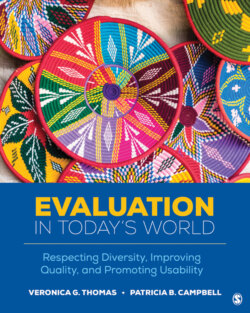Читать книгу Evaluation in Today’s World - Veronica G. Thomas - Страница 20
На сайте Литреса книга снята с продажи.
Evaluative Thinking
ОглавлениеThe concept of evaluative thinking is an increasingly important topic in evaluation and a key component of evaluation capacity and practice (e.g., Baker & Bruner, 2012; Patton, 2008), However as Buckley, Archibald, Hargraves, and Trochim (2015) point out, definitions of evaluative thinking are varied and sometimes ambiguous. They hold that evaluative thinking is, “in essence, critical thinking applied to contexts of evaluation” (p. 376). Other definitions of evaluative thinking describe it as a type of reflective practice, which is “a way of studying your own experiences to improve the way you work” (Brightside, 2020, para. 1). Baker and Bruner (2012, p. 1) see evaluative thinking as a reflective practice that “fully integrates systematic questioning, data, and action into an organization’s work practices” while Michael Quinn Patton (quoted in Waldick, 2011, para. 13) describes it as “an analytical way of thinking that infuses everything that goes on.” After extensive review of the evaluation thinking literature, Buckley et al. (2015, p. 378) proposed the following definition: “Evaluative thinking is critical thinking applied in the context of evaluation, motivated by an attitude of inquisitiveness and a belief in the value of evidence, that involves identifying assumptions, posing thoughtful questions, pursuing deeper understanding through reflection and perspective taking, and informing decisions in preparation for action.”
Reflective practice can be an important component of evaluative thinking. Reflection and reflective practice can catalyze evaluators to
collect information before making up one’s mind;
seek various points of view before coming to a conclusion;
think extensively about a problem before responding;
calibrate the degree of strength of one’s opinion to the degrees of evidence available;
think about future consequences before taking action;
explicitly weigh pluses and minuses of situations before making a decision; [and]
seek nuance and avoid absolutism. (Stanovich, 2010, p. 36)
Evaluative thinking can start by simply asking some questions and investing in the process of answering them. Sometimes, the reflection and discussion themselves are as important as any answer you might come up with (IllumiLab, 2018a). The following activity provides some questions that readers can ask to help promote reflection and evaluative thinking.
